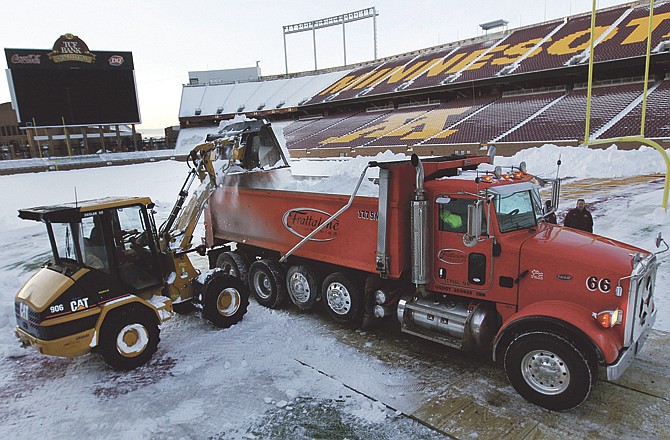MINNEAPOLIS (AP) - The Minnesota Vikings are getting ready for a frigid night of football after officials said Tuesday that the Metrodome's torn roof won't be ready for Monday night's matchup against the Chicago Bears, forcing the game to move to University of Minnesota's TCF Bank Stadium.
Inspectors found that damage from the weekend snowstorm that dumped more than 17 inches in Minneapolis and busted through the Metrodome's Teflon roof was worse than initially thought, according to the Metropolitan Sports Facilities Commission.
Officials decided the roof couldn't be repaired in six days, but could not immediately estimate how long the process would take. Commission president Roy Terwilliger said they hoped to know more in two to three days.
"Our first priority is the safety and well-being of the Vikings fans and players, the hundreds of youth sports, community and other groups that use the Metrodome throughout the year and our employees," he said.
The Vikings immediately turned their "full attention to the University of Minnesota's TCF Bank Stadium," the team said in a statement. Vice president for public affairs Lester Bagley told The Associated Press that the NFL has agreed to allow the game to be played at the roofless Gophers' football stadium.
NFL spokesman Greg Aiello didn't immediately return a call seeking comment.
Workers at the university, meanwhile, began the daunting task of clearing tons of freshly fallen snow from inside the stadium, which opened in 2009 and never has hosted a pro football game.
There are 20-inch-deep snow drifts throughout the facility, and much of it will have to be removed by workers with shovels rather than plows that might damage the stadium's floors, said Garry Bowman, the university's director of athletic communications.
The Vikings have agreed to pick up all preliminary expenses, including plowing, as well as all expenses involved in holding the game, said Scott Ellison, the university's assistant athletic director for facilities. He didn't know how much it would cost to remove the snow, but said he thought it would be considerable. The normal game day budget at the stadium is $250,000, he said.
The snow removal plan is to have groups of 100 workers, working four-hour shifts, for 16 hours a day. Right now, most of those workers are coming from temp agencies.
Officials also have to get the building ready, including the concessions, which are only designed to withstand mid-November temperatures. Ellison said officials would have to put Plexiglass covers over concession stands to trap heat inside.
Monday night's game will fall 29 years to the day after the last time the Vikings played outdoors in Minnesota: Dec. 20, 1981, their final game at the since-demolished Metropolitan Stadium in Bloomington, which the Metrodome replaced. The Vikings lost that game to the Kansas City Chiefs, 10-6.
It promises to be a memorable experience on a night in which long-term forecasts predict temperatures in the single digits or colder.
"I think they'll love outdoor football in Minnesota. I think it'll be a great experience for the fans," he said.
TCF Bank Stadium has a seating capacity of about 50,000 - about 13,000 fewer seats than are available at the Metrodome for football games. University spokesman Dan Wolter said lawyers also are were exploring whether beer will be sold at the stadium, which doesn't allow it for college contests.
In the Metrodome on Tuesday, work crews laid sheets of plywood on the field to keep it dry and used several hydraulic lifts as they began tearing down pieces of the tattered roof.
Inspectors from Birdair Inc., the Amherst, N.Y.-based contractor that built the roof, found that the snow and ice in roof panels that didn't collapse was so deep, it posed a safety hazard to workers - and would have to be dealt with in a slow and painstaking manner.
"We have to go this way, to be on the safe side," Terwilliger said.

